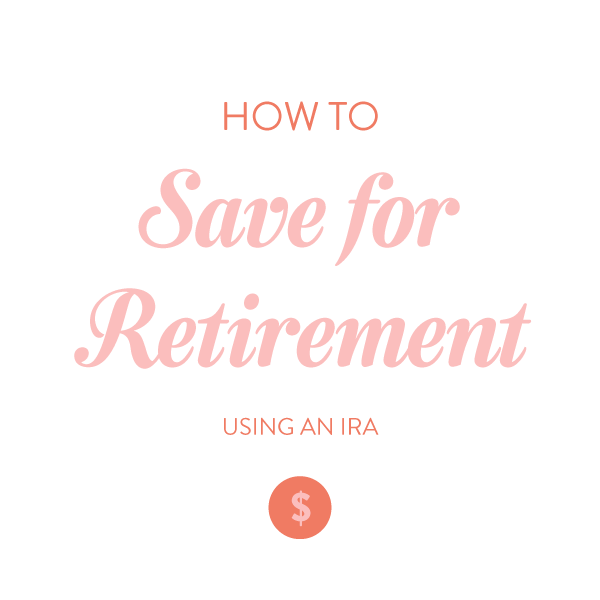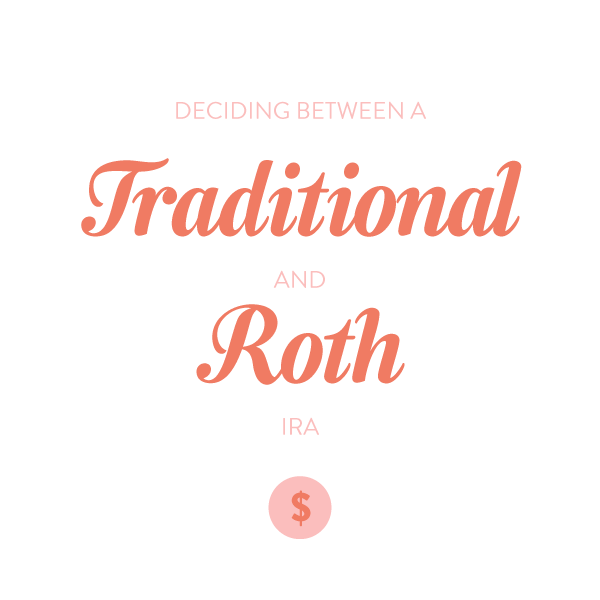Marvelous Money: A Beginner’s Guide to IRAs
A few months back we discussed saving for retirement through a 401k (and a few months before that, we talked about why saving why retirement as early as possible is a good idea!). I promised to address the other way most people save for retirement – IRAs – and now I’m here to deliver! Question and answer seemed to work last time, so we’ll try it again :)
What is an IRA?
An IRA, or Individual Retirement Account, allows you to save money for retirement with tax advantages. The account is held at a financial institution, not through your employer. There are two main types of IRAs – Traditional and Roth – and they have different advantages.
What is a Traditional IRA?
In a Traditional IRA, you’re able to deduct your yearly contribution from your taxable income (reducing the amount of money you have to pay taxes on – yahoo!). Ideally, the money will build up over time, and then in retirement, you’ll pay income taxes on it when you take it out. Many people find themselves in a lower tax bracket when they retire, since they’re not making a salary, so their withdrawals might be taxed at a lower rate than it would have been earlier in life. Tax benefits today, taxes when you withdraw.
What is a Roth IRA?
In a Roth IRA, you pay tax on your income as usual, then contribute to your IRA. Then, your money grows tax-free, and you can withdraw it tax-free in retirement (assuming you retire after age 59 1/2). Taxes when you contribute, no taxes when you withdraw.
Why save in an IRA instead of another type of account?
Great question! First, if your employer offers a 401k, and especially if they offer a match, max out your match first! (Don’t leave money on the table!) But, don’t stop there :) Since experts estimate that you might need up to 85% of your pre-retirement income in retirement, you might not be able to accumulate enough through just a 401k (there are limits on the amount you can contribute per year).
Also, most IRAs offer a wider range of investment choices (stocks, different funds, etc.) than most 401ks, giving you more flexibility. And of course, the investment options you get with an IRA can earn you much more than a savings account, a CD, or other taxable accounts.
How much should I contribute?
Well hold your horses – first you have to have earned income. (I know that seems obvious, but I do have lots of students reading!) For 2014, the maximum amount you can contribute is $5,500 if you’re under 50 (assuming you’ve made at least $5,500 that year). There is no minimum. $5k sound like a lot? John and I love Megan McArdle, and she recommends saving 15% of your gross income for retirement. On the other hand, note that there are some contribution limits based on income – Fidelity explains them here.
How do I get started?
Yay for you! Many financial institutions offer IRAs – we have used Fidelity and Scottrade in the past, and I would recommend both. Most allow you to sign up and make contributions online. A tip – once you have everything ready to go, set up an automatic monthly draft so you don’t have to think about making a contribution each month!
As usual, this is a great time for me to remind you that I am neither a financial planner nor a tax adviser, and that this is a very basic guide to IRAs. Retirement savings are VITAL but can be complicated, so I highly encourage you to seek assistance along the way. As a bonus, many companies, like Fidelity, offer really amazing guidance over the phone, at no charge!
You know why it’s fun to talk about IRAs right now? If you haven’t yet filed your taxes, you can still make a contribution for 2013!
Do you save for retirement with an IRA? Did you choose Traditional or Roth? I’d love to hear!






















Love this series! I set up a traditional one through my employer at the beginning of the year, they match a percent! Large part thanks to you and this series!
If my employer has a 401K for me but is not matching it, should I do the IRA to accumulate more savings?
How did you decide which IRA to do?
Also, you mention “the investment options you get with an IRA can earn you much more than a savings account,” can you describe what those are?
I’ve had a Traditional set-up for a few years now. However, we recently took the Dave Ramsey course, and it seems like Traditional is not the way to go? I chose Traditional due to the fact that I’m a freelancer, and figure I would rather take the tax break now with the hope that I will be in a better financial spot when it comes time to withdraw it – thus, the taxes won’t seem like such a sting then. That’s the theory anyway. But after taking Dave’s course, I wonder if I should switch to a Roth? It can all be a little confusing!
@Kimberly Hooray!! Thank you so much for that encouragement, and way to go you!
@Emily I’ll do my best to answer your questions! As to whether you should choose an IRA over a 401k in the case of no match, the answer is… maybe :) You can contribute more to a 401k per year than you can to an IRA is, if that’s an issue, but you might have more flexible investment options in an IRA. Also, your IRA is not employer-tied, so if you change jobs, you won’t have to worry about moving it! For your second question, it really depends on your situation, particularly whether you are trying to get tax advantages today and what you think your income in retirement will look like. Happily, they’re both great options, so the important thing is just choosing one and starting! I actually have both :) For your third question, the options are things like stocks and mutual funds, which historically have higher returns than a savings account!
@Kelly Agreed! But as I said above, starting and contributing are FAR more important than the type of account, so you are doing the right thing!
Love this post! Will and I love investing in ROTH IRAs, because we love to look at the total amount we’ve invested and it’s growth, knowing we’ll be able to take ALL of it home at retirement. (NO tax burden!) We’ve chosen to do this since neither of us have an IRA match offered to us through work. If we did, we’d love to take advantage of that!
After we got to the point of maxing out both of our Roths, we’ve since opened a SEP IRA as well, which is great for small business owners like myself.
I agree with the 15% of your total income strategy as a starting point! It’s a great way to plan for investing. So many of us think we don’t need to worry about this now, when we are only in our 20’s. ON THE CONTRARY! This is when we see the most benefit! Great post, Em. As usual!
Thank you so much — excellent tips!! Really appreciate your thoughtfulness on this issue and keep these kinds of posts coming. Maybe one on how much to budget for a house/baby/other major life expenses?
Hi Emily! Great tips, especially for a newly employed girl who definitely working on building up her savings. My mom is such a fan of IRAs and this is really helpful to me! Learning how to navigate the 401k journey as well so I can’t wait to get to this step! xo,
Fabulous post! My husband and I both of Roth IRA’s and you did a great job of explaining both of them! I want to look into a SEP IRA since I am self-employed.
Hi Emily! Great post! I’m just getting into planning for retirement and learning the ins and outs of personal finance. I find your posts really helpful! I’m 25 and just started both an IRA and 401k before the tax season ended. While I’ve always prided myself as a really good saver, it’s really hard living in NYC with such a high cost of living to start living on less when I’ve already budgeted for my pre-retirement savings income. Do you and your husband have joint accounts? Did you start your retirement before getting married or after? Is it better to combine your money for more interest? Just curious your thoughts on that! Thanks!